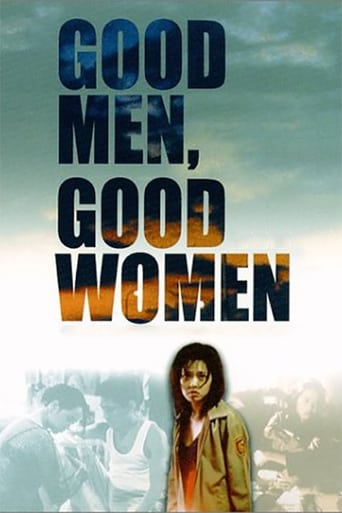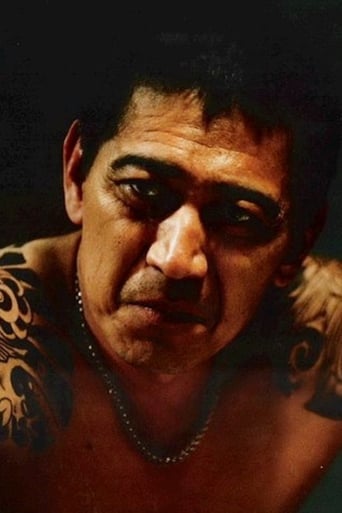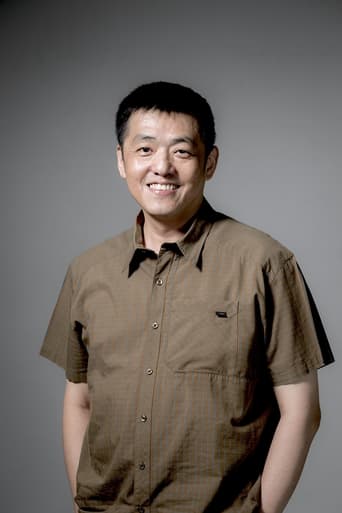

Good Men, Good Women (1995)
An actress preparing to play in a historical epic is terrorized by someone faxing her pages from her stolen diary; has colorful flashbacks of her affair with a now-deceased man; and imagines black-and-white film-within-a-film scenes of the movie she is about to appear in.
Watch Trailer
Cast


Reviews
the audience applauded
A Major Disappointment
I really wanted to like this movie. I feel terribly cynical trashing it, and that's why I'm giving it a middling 5. Actually, I'm giving it a 5 because there were some superb performances.
This film is so real. It treats its characters with so much care and sensitivity.
Encouraged by American foreign policy, the Kuomintang government in Taiwan in the 1950s began a policy of repression of real or suspected communists who were rounded up by the military police, detained, and often shot. This event, known as the White Terror, was suppressed in Taiwan, along with the 2-28-47 massacres, without any public discussion for forty years. Only the trees were witnesses and the story could not be told until martial law was lifted in 1987, yet even now remains clouded with hints of undisclosed crimes. Hou Hsiao-hsien's 1995 film Good Men, Good Women dramatizes the Taiwanese people's fear and reluctance to deal with their past, showing the effects of Taiwan's forgotten history on the destiny of an actress in present-day Taiwan. Dedicated to all the political victims of the 1950s, the film uses the device of a "film within a film" to tell the story of real-life activists Chiang Bi-Yu (also played by Inoh) and her husband Hao-Tung (Giong Lim) who fought in China against the Japanese during World War II but were arrested as Communists when they came home. Good Men, Good Women takes place in three different time sequences: the contemporary world of actress Liang Ching (Annie Shizuka Inoh), her recollection of her recent past as a drug-addicted barmaid, and the world of a yet to be made film about resistance fighters in the 1940s. Hou suggests a contrast between the sterile, corrupt lives of the present generation and the young people of the past who acted with a social conscience. While it is a complex and elliptical film, it is one of Hou's greatest, filled with tenderness and sensuality and an aching melancholy for a world whose promise has remained unfulfilled. The film opens with a parade of young people dressed as peasants who march toward the camera singing a joyous song: "When yesterday's sadness is about to die. When tomorrow's good cheer is marching towards us. Then people say, don't cry. So why don't we sing." The camera then cuts to present day Taipei where an unidentified caller telephones Liang Chang but refuses to speak. The caller has stolen her diaries, and faxes her the pages daily prompting her to recall her tragic relationship with Ah Wei (Jack Kao), a gangster who died in a shootout. The film intersperses scenes of intimacy between the two lovers with the world of the 1940s where Chiang Bi-Yu and Hao-Tung, have left Taiwan for the Chinese mainland to support the anti-Japanese resistance. The "film within a film" shows how Chiang and Hao are forced to put their children in foster care and Liang identifies with Chiang, drawing parallels from her own experience of having to give up the things she loved the most.Hou shows that events buried in a nation's past can have far reaching consequences and that history may be indistinguishable from personal memory. Yet the film is not one of ideas but of images and Hou has provided some memorable ones; for example, when Liang sits before a mirror putting on her makeup as Ah Wei sits closely beside her talking about the possibility of her being pregnant. It is a mundane event, yet Hou imparts it with a mysterious and timeless quality. In many ways, Good Men, Good Women is typical of Hou's films with its static camera, long takes, and rhythms of everyday life, yet it is also his most political, a searing indictment of the squandering of a nation's heritage, allowing us to see that a country, like its people, cannot redeem its future until it tells the truth about its past.
Director Hsiao-hsien Hou seem to be fascinated with the disconnected newer generations in contemporary Taiwan, including it in other films like "Goodbye South, Goodbye". In this film, he takes on the period after the Nationalist retrieved to Taiwan and parallels it with the modern day, putting one story in another as a story which the film is to be based on within a film. In both stories, it is about the turbulent times in which the people as a whole act self destructively, either doing what they think is right as in the Nationalist government or due to their disassociation with the rest of society. The anonymous faxes in the modern period seem to be an indication that incidences either swept behind or intentionally forgotten will come back to haunt you until the issue is confronted. A message that the brutality that happened after the Nationalist's arrival in Taiwan should not be forgotten or ignored, but should eventually be dealt with.This is a movie that bravely confronts issues in a country that is too preoccupied with trying to juggle for positions in the global market. A reminder to everyone that a country's history does not consist of only the valiant highlights, but also of shameful past that should not be discarded.
If you believe in love no matter what their jobs are, watch this movie. If you believe in the power of a film, watch this one. It is a sad love story of a bar hostess but she shares the same love of a social fighter's.
It seems that director Hou has failed dealing with big ideas. This movie is too quiet and too emotionless. His early movies are much better with small everyday facts.




